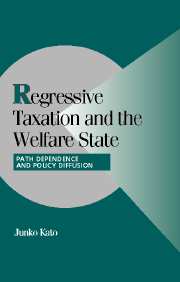Book contents
- Frontmatter
- Contents
- Preface
- Regressive Taxation and the Welfare State
- 1 ARGUMENT: PATH DEPENDENCY AND THE DIFFUSION OF A REGRESSIVE TAX
- 2 EUROPEAN VARIATION: SWEDEN, THE UNITED KINGDOM, AND FRANCE
- 3 CONTRASTING PAIRED COMPARISONS IN OCEANIA AND NORTH AMERICA
- 4 ANOTHER PATTERN OF PATH DEPENDENCE: A COMPARISON BETWEEN JAPAN AND THE NEWLY DEVELOPING ECONOMIES
- 5 THE POLITICAL FOUNDATION OF FINANCING THE WELFARE STATE: A COMPARATIVE VIEW
- Appendix: List of Variables Used for Statistical Analyses
- Bibliography
- Index
- Cambridge Studies in Comparative Politics
1 - ARGUMENT: PATH DEPENDENCY AND THE DIFFUSION OF A REGRESSIVE TAX
Published online by Cambridge University Press: 24 July 2009
- Frontmatter
- Contents
- Preface
- Regressive Taxation and the Welfare State
- 1 ARGUMENT: PATH DEPENDENCY AND THE DIFFUSION OF A REGRESSIVE TAX
- 2 EUROPEAN VARIATION: SWEDEN, THE UNITED KINGDOM, AND FRANCE
- 3 CONTRASTING PAIRED COMPARISONS IN OCEANIA AND NORTH AMERICA
- 4 ANOTHER PATTERN OF PATH DEPENDENCE: A COMPARISON BETWEEN JAPAN AND THE NEWLY DEVELOPING ECONOMIES
- 5 THE POLITICAL FOUNDATION OF FINANCING THE WELFARE STATE: A COMPARATIVE VIEW
- Appendix: List of Variables Used for Statistical Analyses
- Bibliography
- Index
- Cambridge Studies in Comparative Politics
Summary
Economic stagnation and subsequent shortage of government revenue brought the welfare state under intensive censure in the 1980s. The welfare expenditures, which had expanded smoothly during the postwar high-growth period, became a primary target of retrenchment. Despite this overall trend, however, a cross-national comparison of the welfare state defies a simplistic generalization. The golden-age expansion reinforced a demarcation between high-spending and low-spending countries, and moreover, since the 1980s, high-spending countries have proved much more immune to welfare retrenchment than low-spending countries have. As a result, neither rapid expansion during the early postwar period nor subsequent chronic budget deficits have caused a convergence of spending levels among welfare states (Figure 1.1). Tackling this puzzle head on, this study sheds new light on the funding base of the welfare state. Available financial sources serve to restore the public confidence in the welfare state that was severely challenged in the 1980s, whereas financial scarcity makes welfare state backlash inevitable. The divergent funding capacity of the welfare state is path-dependent upon the institutionalization of regressive taxes. The institutionalization of revenue raising from regressive taxes during a high-growth period has enabled the government to secure financial sources during times of low growth. In contrast, a government's attempt to institutionalize a regressive tax system during low growth is thwarted by public suspicion that a new burden would be exhausted to solve deficits without any welfare compensation. Tax politics ultimately explains the diversification of high-spending and low-spendingcountries.
- Type
- Chapter
- Information
- Regressive Taxation and the Welfare StatePath Dependence and Policy Diffusion, pp. 1 - 52Publisher: Cambridge University PressPrint publication year: 2003

